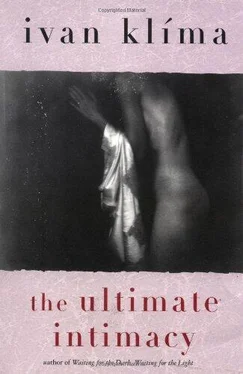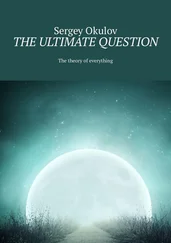Ivan Klima - The Ultimate Intimacy
Здесь есть возможность читать онлайн «Ivan Klima - The Ultimate Intimacy» весь текст электронной книги совершенно бесплатно (целиком полную версию без сокращений). В некоторых случаях можно слушать аудио, скачать через торрент в формате fb2 и присутствует краткое содержание. Год выпуска: 1998, Издательство: Grove Press, Жанр: Современная проза, на английском языке. Описание произведения, (предисловие) а так же отзывы посетителей доступны на портале библиотеки ЛибКат.
- Название:The Ultimate Intimacy
- Автор:
- Издательство:Grove Press
- Жанр:
- Год:1998
- ISBN:нет данных
- Рейтинг книги:3 / 5. Голосов: 1
-
Избранное:Добавить в избранное
- Отзывы:
-
Ваша оценка:
- 60
- 1
- 2
- 3
- 4
- 5
The Ultimate Intimacy: краткое содержание, описание и аннотация
Предлагаем к чтению аннотацию, описание, краткое содержание или предисловие (зависит от того, что написал сам автор книги «The Ultimate Intimacy»). Если вы не нашли необходимую информацию о книге — напишите в комментариях, мы постараемся отыскать её.
The Ultimate Intimacy — читать онлайн бесплатно полную книгу (весь текст) целиком
Ниже представлен текст книги, разбитый по страницам. Система сохранения места последней прочитанной страницы, позволяет с удобством читать онлайн бесплатно книгу «The Ultimate Intimacy», без необходимости каждый раз заново искать на чём Вы остановились. Поставьте закладку, и сможете в любой момент перейти на страницу, на которой закончили чтение.
Интервал:
Закладка:
He really is beginning to examine his past without making excuses or justifying himself, and that's important. He has lots of good resolutions, I only hope he finds in himself the strength to act on some of them, at least.
Martin Hájek paid me a visit last week. He was remembering how they had refused to grant him a licence when he graduated from college and how, two years later, he received it for a remote parish in the Moravian Highlands. His fate was similar to mine. He wondered whether it didn't strike me occasionally that even in those frightful times we felt better than we do now?
We recalled how on the first Monday of every month we would hold a gathering of young people, some of them coming from very distant congregations. And we would often have discussions with people who were officially 'non-persons'. We talked for a while about how in those days we had a sense of mission. Or was it just a feeling of pride in our mission and our resistance? 'Do you know I met Berger in Jihlava?' Martin said. Berger had been the Secretary for Church Affairs for the two of us until a few years ago, but it seemed to me at that moment as if he belonged to another life altogether. 'What is he up to?' I asked.
'He's bought a pub, but he spent the whole time telling me about his ailments. I was expecting him to make some mention of what he used to do, that he'd maybe try to apologize for the way he treated us, but it didn't even occur to him to do anything of the sort. He behaved towards me as if we were old acquaintances or friends. '
'Humility is foreign to them, no one taught it to them,' I said.
Martin went on to ask about my mother and I told him her soul was growing wearier all the time. Then we talked about our children, and Martin remembered Jitka too. Generally everybody keeps quiet about her. It's not done to mention the departed, because it might upset those who remain. And the dead move further and further away from us until in the end we are unable to make out their shape.
I always find being close to death oppressive. I repeat to myself Paul's words: 'He has freed us from the very arms of death and will free us…' And also his message to the Romans: 'Yet the hope remains that the very Creation will be freed from the thraldom of death and be led into the freedom and glory of the Children of God. ' And yet I feel anxious. More so than most other people perhaps. Most people follow Spinoza's dictum: Homer liber de nulla re minus quam de morte cogitât.
But a preacher expounding the Scriptures is in permanent contact with death — the issue of resurrection from the dead is the beginning and end of our message. A thought sometimes occurs to me: it wasn't just the Holy Spirit that ensured that, in spite of all the oppression, Christianity spread through the world and overcame all the pagan cults; the promise of eternal life also had a powerful effect. The moment we are freed from the clutches of death, from the law which binds all living things without exception, our entire being acquires a different perspective. The anxiety felt by every beast being led to the slaughter, or maybe even by the fly caught in the spider's web, is banished or at least attenuated. I reproach myself for my doubts. But were not the very apostles who witnessed the wonders that took place themselves prone to doubt sometimes? Didn't Thomas ask to touch Christ's wounds in order to believe?
And why did that wonder take place then, of all times; almost two thousand years ago, when the Jews fervently believed in the coming of the Messiah? Why, since then, has He only looked on in silence?
The Apostle Paul also wrote: And if Christ has not been raised your faith is futile; you are still in your sins. Then those also who have fallen asleep in Christ are lost. If only for this life we have hope in Christ, we are to be pitied more than all men. ' (1 Corinthians 15: 17–19) I have read and even preached those three verses but none the less there is something that strikes me each time I read them. It's as if the apostle here was not referring to what happened but to how badly off we would be if it had not happened. As if faith ought not to be founded on the event, but that the event should be based on the fact that without it we would be simply wretched mortals like the rest of creation.
I ought to go to the hospital. I think about my mother all the time, but the awful thing is that even though she is still alive I think about her in the past tense. She was always severe but kind. She seldom kissed or hugged me but she was never unkind. I suppose she was just shy of showing her feelings. I take after her in that respect.
When they sent my father to prison they sacked her from the school where she was teaching and eventually she found a job with a bookbinder. She once brought me a beautifully bound book — a life of Comenius. She said: 'Nobody has been to collect this book for over a year.
They are either in prison or dead. You can read it for now. 'It was not at all the sort of reading matter that appealed to me — I wasn't yet nine — but I loved that strange, captivating language. It sounded like music. And that musical language drew me to him. I have a picture of Comenius hanging in my office even though I have an aversion to worshipping saints of any kind.
I wanted Mother to move in with us but she refused. During the last six months I have visited her at least three times a week and taken care of her. I did her shopping, cooked for her and in the end even fed her. I used to tell her that I was praying for her, but I couldn't tell her I loved her. It's something I can't even say to Hana. It's as if inside me there is a rock face that I first have to scale. I managed to climb real rock faces with Jitka but this one beats me.
I am faithful but am incapable of being intimate. With Him still, maybe, but not with people. Not with my mother, nor the children nor with Hana. And intimacy is the first degree of fidelity, surely? Or is it the other way round: fidelity is the first degree of intimacy?
One of my first memories. A pile of sand that had been tipped in front of the house (at the time we were still living in the villa in Střešovice which they moved us out of when they sent my father to prison). I was happy to have the chance to play in the sand. All of a sudden right in front of me there appeared an enormous cur with jaws half open and teeth bared. I was terror stricken and couldn't move. I expect I started to cry but I don't really remember. I just recall that primitive anxiety, a sense of menace that derived not from my own experience but the experience of our species. Then suddenly saving hands appeared — Mother's — and lifted me up high. Mother's soothing voice like music, like a prayer, like the song of angels. The assurance of safety and love.
It's ages since those hands were capable of lifting me up; on the contrary it is I who have been lifting Mother these past weeks and carrying her to the bathroom, or to her bed, or to the window to let her breathe a bit of fresh air. But even so, those hands — wrinkled and veined beyond recognition — still lived and could still caress. When they cease to live, the assurance of safety and the assurance of love will have gone.
When my father was near to death he lay in the hospital. Being a doctor he had his own ward and we could visit him whenever we liked. I would go and see him every day. We would talk about trivial things and avoid any mention of death. Father wanted to live but he knew that his heart would give out soon. One day I finally made up my mind and told him that his existence would not end with death, that the soul would not die but would live for ever.
Читать дальшеИнтервал:
Закладка:
Похожие книги на «The Ultimate Intimacy»
Представляем Вашему вниманию похожие книги на «The Ultimate Intimacy» списком для выбора. Мы отобрали схожую по названию и смыслу литературу в надежде предоставить читателям больше вариантов отыскать новые, интересные, ещё непрочитанные произведения.
Обсуждение, отзывы о книге «The Ultimate Intimacy» и просто собственные мнения читателей. Оставьте ваши комментарии, напишите, что Вы думаете о произведении, его смысле или главных героях. Укажите что конкретно понравилось, а что нет, и почему Вы так считаете.






![Theresa Cheung - The Dream Dictionary from A to Z [Revised edition] - The Ultimate A–Z to Interpret the Secrets of Your Dreams](/books/692092/theresa-cheung-the-dream-dictionary-from-a-to-z-r-thumb.webp)





